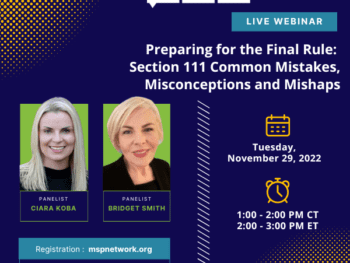There has been a lot of discussion recently in the insurance world about the SMART Act (Saving Medicare and Repaying Taxpayers Act) passed into law by Congress in December and signed by President Obama on January 10, 2013.
Designed to Address Medicare Secondary Payer Statutes
The SMART Act came about due to the conflicts that occur between state workers’ compensation insurance laws and the federal laws overseen by the Centers for Medicare and Medicaid Services (CMS). The largest area of conflict was the settlement of workers’ compensation claims that left Medicare paying for future medical treatment of injured employees.
The main initiative to address this problem was the Medicare Secondary Payer (MSP) statutes. The MSP Act requires insurance companies, including workers’ compensation insurers’ to be the primary source of payment for all injuries to people. When a workers’ compensation insurer settles a workers’ compensation claim, MSP statutes require the insurer to either prepay the future cost of medical care, or to keep the medical portion of the claim open until the injured employee no longer needs medical care. If the insurer failed to protect Medicare from payment of work-related, injury medical bills, Medicare can hold various parties responsible for reimbursement of the Medicare paid expense, including the insurer, employer, employee, attorneys who had represented one of these parties, and even the medical provider.
While the intent of MSP was proper, the MSP statutes created a whole new set of problems for insurers, employers and injured employees. Different sections of the SMART Act are designed to eliminate some of those problems (but it is too early to determine what new problems will be created by the SMART Act).
Primary Changes in Act
Most risk managers and workers’ compensation managers know the SMART Act is about changes in Medicare Secondary Payer (MSP) statutes, but most don’t know the details of the changes in the law. The primary changes brought about by the SMART Act include:
- The SMART Act provides Medicare 9 months to create or to alter the operational guidelines to enforce the changes brought about by the SMART Act
- A minor change is the alteration of the low dollar threshold exemption for MSP compliance. For example – the injured employee is 64 years old at the time of claim settlement (within 30 months of Medicare eligibility). Five years later the claimant incurs a single $250 medical bill. Medicare will not pursue recovery of the low dollar claim. The current low dollar threshold is $300. The change in the law will allow annual adjustments in the low dollar threshold.
- A major change is the mandatory $1,000 per day penalty for non-compliance with MSP is being changed to “up to $1,000 a day”. The change was made to eliminate the fines being given to insurers, employers, employees, attorneys, etc. who had made a good faith effort to comply with the MSP law. The SMART Act gives Medicare 60 days to solicit suggestions on how the penalty provisions can be enforced while protecting those who have tried to comply with the law from being fined.
- A change in the law that will probably have no impact on workers’ compensation insurers and employers is the change in the law that permits, but does not require, the use of social security numbers. (The alternative is a Health Care Identification Number assigned to an individual). Medicare currently uses social security numbers to track their payment history on each person. As employers are required to use social security numbers for federal taxes, the continuation of using social security numbers in workers’ compensation claims is not expected to change.
- A change for the better is the new 3 year statute of limitations on all legal complaints brought by Medicare and all actions seeking penalties. (Previously there was no statute of limitations and an insurer’s or employer’s exposure continued forever). The statute of limitations is 3 years from the date Medicare is notified of a judgment, settlement, award or any other payment subject to their reporting guidelines. If an insurer fails to report to Medicare a judgment, settlement, award or any other payment subject to the Medicare reporting guidelines, the 3 year statute of limitations does not start to run until they are notified.
Hiccups Expected Along the Way
If it was only this simple. As Medicare is a government agency which has been given the responsibility of modifying their own internal procedures to comply with the SMART Act, it is expected there will be hiccups along the way. Also, prior changes in the MSP statutes have resulted in unintended consequences. That could be the case with the SMART Act. Employers, insurers, third party administrators and other parties responsible for reporting information to Medicare should continue to practice their own internal established procedures to insure compliance with MSP requirements.
Author Rebecca Shafer, JD, President of Amaxx Risk Solutions, Inc. is a national expert in the field of workers compensation. She is a writer, speaker, and publisher. Her expertise is working with employers to reduce workers compensation costs, and her clients include airlines, healthcare, printing/publishing, pharmaceuticals, retail, hospitality, and manufacturing. She is the author of the #1 selling book on cost containment, Workers Compensation Management Program: Reduce Costs 20% to 50%. Contact:RShafer@ReduceYourWorkersComp.com.
Editor Michael B. Stack, CPA, Director of Operations, Amaxx Risk Solutions, Inc. is an expert in employer communication systems and part of the Amaxx team helping companies reduce their workers compensation costs by 20% to 50%. He is a writer, speaker, and website publisher. www.reduceyourworkerscomp.com. Contact: mstack@reduceyourworkerscomp.com.
©2012 Amaxx Risk Solutions, Inc. All rights reserved under International Copyright Law.












